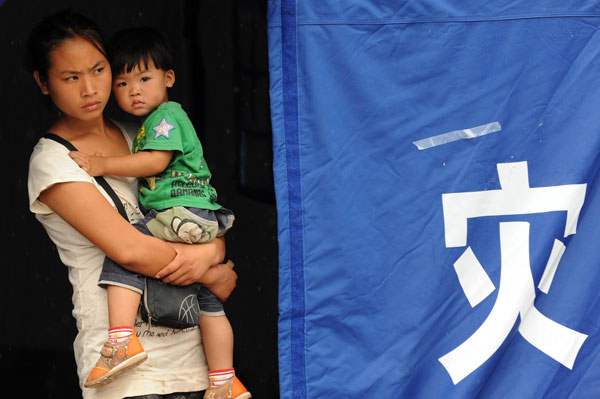 |
|
A mother and her child in a tent at a relocation site in Yiliang,Yunnan province, on Tuesday.WEI XIAOHAO / CHINA DAILY |
Zhou Litang was at a meeting on Friday morning in Yiliang county when the earthquake struck.
"The floor suddenly shook violently and everything was moving. All of us realized an earthquake had hit."
Zhou quickly ran outside and called his wife. After assuring himself his family, who live in the urban area of the county, were OK, he made the decision to drive to the worst hit area and repair the road so rescuers could get through.
"Although I survived the earthquakes I realized there must be many sufferers in those isolated mountainous areas," Zhou said. "I immediately called my colleagues and they all agreed. We cannot just stand by and see people in our hometown suffer."
Less than two hours after the first earthquake, Zhou, who heads a construction team at Yongjia Construction Company in Yiliang, Yunnan, started the journey with about 30 of his team members and three vehicles including a digger. However, they made slow progress.
"As we were driving to Luozehe township, the hardest hit area, we had to stop frequently to clear the big rocks and mud scattered on the roads, and rocks kept falling from the slope beside the road."
As a result, the journey, which usually takes half an hour, took two hours.
"When we arrived at Shuinichang village, we found we were the first rescuers in the area, and soldiers and medical teams had not yet arrived," Zhou said.
"We saw big rocks blocking the road, and rocks were still falling from the slopes. Most houses in the village had collapsed or were seriously damaged," he said.
Several bodies were lying on the ground, and many villagers were gathering in the open area. Some were weeping, he said.
"I felt very sad, but also a little scared," Zhou said. "Mobile signals were all gone, and I couldn't help thinking what we would do if anything happened to us."
Zhou and his colleagues focused on removing the stones and tree branches that fell from mountains and blocked the roads. After the digger carried them away and left them at the canyons beside the road, he and his colleagues used their hands to remove debris.
After strong rains on Monday night, work became more difficult because the rain caused many mudslides, and some roads that had been cleared were blocked again.
Zhou said that since Friday, several of his team members have joined the rescue efforts.
"It is not very hard work, compared with what we did at construction sites before," Chen Shaohua, a member of the team, said. "But it is much more dangerous. My left hand has been bruised from carrying away stones. And the door of the vehicle I drove was damaged just now after being hit by a stone rolling down from the mountain slope."
"Sometimes when I am too tired, I just stay in the vehicle to have a rest."
Zhou said he had not returned home since the earthquake on Friday, and the only food they have been eating is instant noodles and boiled potatoes.
The central and local government responded quickly to the earthquakes. The day after the quake, more than 7,000 soldiers, doctors and officials were working around the clock to save lives. The number exceeded 10,000 soon.
With more rescuers arriving at the quake-hit area, Zhou said he feels a little relieved.
"We will continue to work here until the roads are unblocked," Zhou said.
Contact the writers at [email protected] and [email protected]
